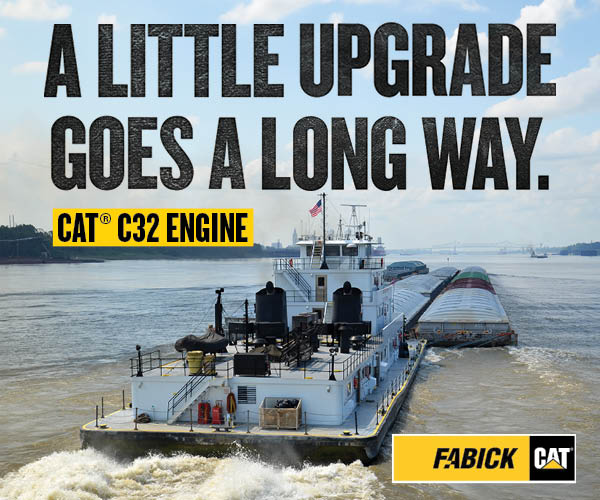Washington, D.C.—A key Senate committee voted unanimously to advance its water resources bill to provide roughly $17 billion in new authorization for infrastructure projects, cut red tape and push a two-year goal for completing feasibility studies, deepen nationally significant ports and maintain inland waterways navigability.
America’s Water Infrastructure Act (AWIA) of 2020 (S.3591) now heads to the Senate floor along with the Drinking Water Infrastructure Act of 2020 (S.3590), which also received a 21-0 vote.
“Our committee has taken a significant step to improve our dams, ports, flood-prevention infrastructure, reservoirs and drinking water systems,” said Sen. John Barrasso (R-Wyo.), chairman of the Senate Environment and Public Works Committee.
“The legislation will help ensure American-made goods are safely shipped from one state to another.”
Waterways Council Inc. (WCI) welcomed the committee’s action, saying the AWIA includes its top priority to adjust the cost-share for construction and major rehabilitation of inland waterways projects to 35 percent from the Inland Waterways Trust Fund and 65 percent from general revenues, compared to the 50-50 split.
“This development benefits the nation by potentially providing $1 billion in additional construction funds over 10 years,” WCI stated, adding the change also could help projects to advance more efficiently.
WCI also pointed to a provision authorizing the Chief’s Report for Gulf Intracoastal Waterway, Brazos River Floodgates and Colorado River Locks at the 35/65 cost share.
Language in the bill also encourages the U.S. Army Corps of Engineers to expedite the completion of the Kentucky Lock Post Authorized Change Report, which sets a new authorized amount for that project’s total construction cost.
Barrasso said the two bills along with a major highway bill advanced months ago by the panel could answer President Donald Trump’s call for more infrastructure spending and be critical to the nation’s economic recovery once the current pandemic crisis passes.
Sen. Tom Carper (D-Del.), the panel’s ranking member, also praised the bill, saying Americans rely on U.S. Army Corps of Engineers projects to navigate the nation’s waters and to stay safe from flooding.
Despite the unanimous vote, Carper said work remains to be done on the water infrastructure bill before it can hit the floor, singling out Democrats’ hope to ensure the many types of ports receive a “balanced distribution” of funds from the Harbor Maintenance Trust Fund.
In a recent letter, the National Waterways Conference praised committee leaders for their commitment to water resources and thanked them for keeping to a schedule of authorizing legislation every two years.
Rep. Peter DeFazio (D-Ore.), chairman of the House Transportation and Infrastructure Committee, plans on introducing his version of the legislation before Memorial Day.
Differing Priorities
President Trump continues to promote his desire to do an infrastructure bill, but now with a new twist.
“We’re not doing anything unless we get a payroll tax cut,” Trump said during a virtual town hall with Fox News at the Lincoln Memorial.
That remark followed soon after he said, “we will be doing infrastructure.”
Asked about that presidential redline two days later, Senate Majority Leader Mitch McConnell (R-Ky.) reminded reporters he has one of his own.
“If there is another bill that passes in the Senate, it will include liability protection,” McConnell said, referring to legislation described as a narrowly drawn effort to protect healthcare workers and others dealing with the pandemic from what he called an epidemic of lawsuits.
House Speaker Nancy Pelosi (D-Calif.) continues to push for additional funding for state and local governments to help them deal with what they have spent fighting the COVID-19 pandemic.
Economic Impact Of COVID-19
The American Association of Port Authorities reported impacts of the COVID-19 pandemic included a drop of up to 25 percent on both containerized cargo and bulk cargo movements and a revenue loss of roughly $300,000 per blank sailing or canceled port call at large ports.
“Small ports around the country are especially hard hit, where there are often only one or two types of cargo and if demand drops they go to zero,” AAPA stated in its April 30 report.
Meanwhile, a key senator sent a letter to the infrastructure and freight transportation industries seeking feedback on how the crisis has impacted the supply chain, freight movement, transportation networks and consumers as well as ways the freight network can continue to be resilient in addressing future unforeseen events.
“The COVID-19 crisis has brought serious new challenges and hardships to our nation,” said Sen. Roger Wicker (R-Miss.), chairman of the Senate Committee on Commerce, Science and Transportation.
“Our truck drivers, railroad workers, port operators, pipeline engineers, and many others are working to ensure that our freight transportation network and critical infrastructure continue to deliver during this unprecedented time.”
Recipients of Wicker’s letter included AAPA President and CEO Chris Connor and Cindy Cutrera, president of Inland Rivers, Ports & Terminals.
Project Requests
The U.S. Army Corps of Engineers submitted its request for feasibility reports from non-federal interests, proposed modifications to authorized water resources development projects and environmental infrastructure program authorities to be included in an annual report to Congress.
Proposals must be submitted online by August 31 at https://www.usace.army.mil/Missions/Civil-Works/Project-Planning/WRRDA- 7001-Proposals/.
Details on an alternative method of submission and other requirements were published in the May 1 Federal Register.
For additional information, contact Stuart McLean at 202-761-4931.




